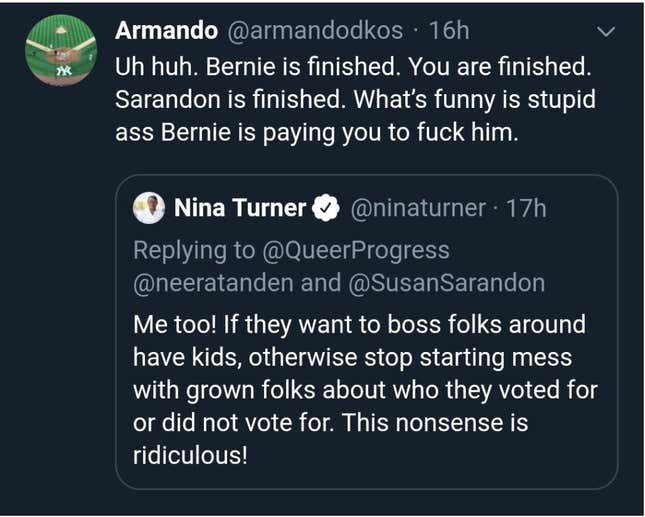
It can be tempting to think that social media is a veneer providing some level of protection from problematic face-to-face interactions. But on a platform known to constantly spew hostility and hatred towards black women and women of color, it is anything but.
From research and analysis, we know Twitter can be a breeding ground for anti-blackness in general and venom towards black women in particular. If Twitter is unable to offer proactive protection for black women on its platform, black women should abandon it altogether. If Twitter is serious about stopping hate and abuse targeting black women, black women should be a part of strategy discussions on how to stop such behavior. Those are the two options.
In a December 2018 report, Amnesty International found that social media can be a toxic place, and the most abused groups on social are women of color and black women. The evidence for this is widespread, and the purveyors of abuse are often men from all walks of life
Consider the time in 2017 when rapper French Montana responded to a black woman who said no one was checking for him: ‘“U musty crusty dusty rusty ass hoe…With them nappy ass poetic justice braids…”’ The rest of his response is just too vulgar to repeat.
Or more recently, with attorney Armando Llorens, who until recently was a deputy editor at Daily Kos, a group blog and forum for Democratic politics, took to Twitter to fire off vicious tweets targeting former Ohio State Senator and Bernie Sanders 2020 co-chair Nina Turner. Llorens said on Twitter that Turner was “a fucking idiot,” that she was finished, and that Sen. Sanders was finished. He went on to state that Sanders was paying her for sex. And in recounting this misogynist drivel, I am being far more gracious than he.

After a group of supporters challenged Daily Kos for failing to hold Llorens accountable, he was fired. Whether one agrees with Turner’s politics is beside the point. Llorens’ behavior was not only atrocious it also exemplified the regular abuse that black women experience online.
In March 2017, following a speech by U.S. Congresswoman Maxine Waters on the House floor, commentator Bill O’Reilly told Fox & Friends, “I didn’t hear a word she said, I was looking at the James Brown wig.” It is unconscionable that a woman who holds one of the most important positions in U.S. politics is being publicly ridiculed about her hair, yet, whether its a rapper from the Bronx, or a commentator on Fox News, abuse of this sort is typical for black women.
The 2018 Amnesty “Troll Patrol” report found that black women were disproportionately targeted, being 84 percent more likely than white women to be mentioned in abusive or problematic tweets. One in ten tweets mentioning black women was abusive or problematic compared to one in fifteen for white women.” Further, according to the report, “Black and minority ethnic women were 34 percent more likely to be mentioned in abusive or problematic tweets than white women.”
U.S. Representative Alexandria Ocasio-Cortez also receives her fair share of harassment online. Earlier this year she had to insist that fake nude photos of her allegedly posted by Republicans and reposted by the Daily Caller be taken down.
Leslie Jones faced widespread harassment and abuse after being cast in a remake of Ghostbusters. Actress Grace Saif, from 13 Reasons Why, and Riverdale’s Ashleigh Murray are two of the latest black women to talk about online abuse. From Meghan Markle to the newest Little Mermaid, Haile Bailey, to author Ijeoma Oluo, being harassed online is par for the course for black women.
What’s clear is that the abuse of black, Latina, and Native women online is rampant and pervasive.
Online abuse includes threats, sexual harassment, threats of rape and sexual violence, retaliation against supporters’ victims, threatening In Real Life attacks, using gender-based slurs, false accusations and more. The Women’s Media Center has a wonderful primer of the different forms of online abuse here.
As WMC explains, online abuse takes many forms and hues. It is striking, though that sex is always weaponized against us. If we are too attractive, we are accused of using our looks to get what we want. If we have a modicum of success, we are accused—as Tomi Lahren accused 2020 presidential candidate, Sen. Kamala Harris—of sleeping our way to the top. This suggestion is the currency of misogynists.
Returning for a moment to Llorens’ abusive comments targeting Nina Turner: the truth is that many black women have been taught from childhood that we have to work twice as hard to be considered half as good. Yet as hard as we work, we still struggle to be paid our worth. A Center for American Progress report issued around Black Women’s Equal Pay Day noted that black women will have to work until August 2019 to earn what white men earned in 2018. We claw and fight for every promotion, raise and opportunity. Even when we are qualified, we are met with resistance.
It is clear to me that it doesn’t matter how much education we have or how many positions we have held, we are never completely shielded from abuse or from the assumption that we do not belong.
At least three things need to happen immediately. One, allies of black women need to continue speaking up about harassment and misogynistic abuse. They should do so without being asked. Next, if social media platforms such as Twitter are serious about addressing online abuse, black women must be included in discussions about solutions. Nothing for us without us.
Finally, if problems persist, we should seriously consider a social media strike. All black women and our allies should abandon these sites until there is meaningful change. We wouldn’t continually walk into a space that is physically dangerous, so maybe we should rethink our engagement with social media platforms as well.
We deserve better and we are demanding better; not just from the people lobbing these attacks, but from those who observe in silence.
Jennifer R. Farmer is an author, lecturer and strategic communicator for organizations, executives and celebrities committed to social good. She is the author of Extraordinary PR, Ordinary Budget: A Strategy Guide. Follow her on IG/Twitter using @pr_whisperer.